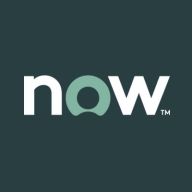


Find out what your peers are saying about Microsoft, Salesforce, ServiceNow and others in CRM Customer Engagement Centers.
I recommend that those considering Microsoft Dynamics CRM conduct an ROI exercise to determine scalability and complex business needs because it is indeed a fantastic tool, especially if Microsoft can provide a better commercial model, which can significantly impact cost-effectiveness.
Salesforce Service Cloud requires significant maintenance effort to see ROI.
They have removed the costs associated with on-prem infrastructure, including data center costs, power costs, and physical server costs.
The return on investment is good when implementing for ourselves and for other clients.
Manually, there are huge numbers that come up because these integrated tools help organizations make the right decisions with all the information in one place, while manual methods lack visibility.
I would rate customer support as ten out of ten.
While the support operates within their standard SLA, it can be difficult to speak directly with someone over the phone.
Sometimes the technical support for Microsoft Dynamics CRM is not qualified enough, and in some situations, we know the tool better than they do.
Unless you have premium support, assistance is restricted.
Salesforce directly does not give you the support, and it is through the partner that you have to go, leading to some time delays.
The support is exemplary and deserves a perfect rating.
Obtaining support for maintenance is the current challenge because they don't have a presence in the local market.
Whenever we have had issues, they have provided good support, and those issues have never recurred.
Microsoft Dynamics CRM is highly scalable, rated at ten, even fifteen out of ten.
I would give it a ten out of ten for scalability.
Microsoft Dynamics CRM is scalable; it's easy to scale, but when customizations become extensive, maintainability can become challenging.
Salesforce Service Cloud is the most advanced in scalability, rating around nine to ten.
Nobody can compete with Salesforce Service Cloud's scalability.
There are no limitations or performance issues with ServiceNow; it is cloud-based, so it is highly scalable and performs well.
It is capable of vertical scaling with no issues.
I rate the scalability of ServiceNow as an eight on a scale of one to ten.
I would rate it ten out of ten.
There have been instances where issues with Microsoft Azure have affected Dynamics due to the infrastructure layer.
We rarely encounter stability issues with Salesforce Service Cloud, although when they occur, they cause significant disruption.
It is cloud-based, so it is highly scalable and performs well.
I haven't faced any issues with stability; I've rarely seen any downtime.
ServiceNow is stable enough.
More use-case-oriented material should be provided to help users and implementers learn how to do more, faster.
Microsoft Dynamics CRM needs improvement in simplifying the setup and configuration process, which can be relatively complex when we want all features to work properly.
Microsoft Dynamics CRM doesn't provide solutions that allow you to transform easily if you have a heterogeneous mix of technologies or if your contact center is on analog and you try to digitize it.
Salesforce Service Cloud should focus on simplification.
Configuring Flows in Salesforce Service Cloud is very difficult.
It could be better in areas such as media; it does not handle media effectively, particularly with pictures and uploads.
It makes no sense in my opinion, and they should offer the team at the front to help customize the product to fit each company's needs, as every company has different demands and forms of submitting a request that need adjustment over time.
There is a need for bug or error tracking in ServiceNow.
Their customer support could make it a great solution, not just product support but also their relationship with partners and training initiatives in different regions.
The pricing of Microsoft Dynamics CRM can be complex due to Microsoft's complicated licensing model.
Microsoft Dynamics CRM costs about $110 to $115 per user per month, following a recent price increase.
Although it is a good tool, it is costly.
The approximate licensing costs for Salesforce Service Cloud are around three hundred dollars a year per user.
Salesforce Service Cloud is expensive.
ServiceNow's pricing can be justified if more functionality is required.
ServiceNow does come with a price.
ServiceNow is expensive for all regions.
The backend storage integrates seamlessly with OneDrive, and the solution offers robust security features, including Azure integration, two-factor authentication (2FA), and comprehensive audit trails.
The CRM is very fast, which is the most important aspect, and it's very handy.
The most valuable feature of Microsoft Dynamics CRM is its integration with Outlook and other Microsoft products like Microsoft 365, which includes emails, Teams, and SharePoint.
Salesforce Service Cloud improved our organization with its mobile capabilities.
Salesforce Service Cloud offers pre-built packages that are best in class.
Usability is one of the strongest characteristics of Salesforce Service Cloud.
ServiceNow provides a wide range of functionality, covering all the necessary modules, unlike Jira which is primarily for IT.
Automation capabilities are impressive, bolstered by a vast repository of out-of-the-box connectors and plugins that facilitate integration with various applications worldwide.
The features of ServiceNow that I find most valuable include its ability to easily access ticket details if you know the ticket number, monitor the timeline of when the ticket was created, and see the current status.
| Product | Market Share (%) |
|---|---|
| Microsoft Dynamics CRM | 18.2% |
| Salesforce Service Cloud | 13.5% |
| ServiceNow Customer Service Management | 8.1% |
| Other | 60.2% |
| Product | Market Share (%) |
|---|---|
| Salesforce Service Cloud | 13.5% |
| Microsoft Dynamics CRM | 18.2% |
| ServiceNow Customer Service Management | 8.1% |
| Other | 60.2% |
| Product | Market Share (%) |
|---|---|
| ServiceNow | 19.6% |
| JIRA Service Management | 8.3% |
| BMC Helix ITSM | 7.5% |
| Other | 64.6% |



| Company Size | Count |
|---|---|
| Small Business | 41 |
| Midsize Enterprise | 22 |
| Large Enterprise | 19 |
| Company Size | Count |
|---|---|
| Small Business | 20 |
| Midsize Enterprise | 13 |
| Large Enterprise | 24 |
| Company Size | Count |
|---|---|
| Small Business | 54 |
| Midsize Enterprise | 36 |
| Large Enterprise | 164 |
Microsoft Dynamics CRM is a comprehensive customer relationship management solution that helps businesses streamline their sales, marketing, and customer service processes. With its user-friendly interface and powerful features, it enables organizations to effectively manage their customer interactions and drive business growth.
One of the key features of Microsoft Dynamics CRM is its sales automation capabilities. It allows sales teams to track leads, manage opportunities, and close deals more efficiently. The solution provides a centralized platform for managing customer information, enabling sales representatives to access real-time data and make informed decisions. It also offers tools for forecasting, pipeline management, and sales analytics, helping businesses optimize their sales processes and drive revenue growth.
In addition to sales automation, Microsoft Dynamics CRM offers robust marketing automation features. It enables marketers to create and execute targeted marketing campaigns, track campaign performance, and generate actionable insights. The solution provides tools for lead management, email marketing, social media integration, and customer segmentation, allowing businesses to engage with their customers effectively and drive marketing ROI.
Furthermore, Microsoft Dynamics CRM helps organizations deliver exceptional customer service. It provides a unified view of customer interactions, enabling customer service representatives to deliver personalized and timely support. The solution offers case management, a knowledge base, and self-service portal capabilities, empowering customers to find answers to their queries and resolve issues on their own. It also provides tools for service analytics and reporting, helping businesses identify areas for improvement and enhance customer satisfaction.
Service Cloud is fully customizable support and help desk that provide faster, smarter service that will increase loyalty, retention, and satisfaction. From call-center software to self-service portals, our service solutions enhance your customer service with more responsive, more intuitive, more flexible support that anticipates customer needs.
ServiceNow is a cloud-based task-management platform that specializes in IT operations management (ITOM), IT services management (ITSM), and IT business management (ITBM). ServiceNow allows users to manage their teams, projects, and customer interactions using a variety of different plugins and apps with which it easily integrates.
ServiceNow offers prebuilt applications to support any process, as well as a framework and tools that allow you to build your own.
ServiceNow’s service management solutions include change, request, incident, problem, and cost management, as well as HR, IT, field service, and facilities management solutions. They also cover business management solutions such as vendor performance management, financial management, performance analytics and project portfolio suite, as well as governance, risk, and compliance.
“The Smarter Way to Workflow”
ServiceNow’s activities, processes, and tasks are overseen as part of a comprehensive managed workflow that supports such features as real-time collaboration, communication, and resource sharing. ServiceNow’s suite of products allow for operation using serverless computing, and include the categories of Business Apps, Customer Service, HR, IT, and Security.
ServiceNow can be used to support most workflows because of the wide range of tools it offers. These include on-suite ticketing tools, predictive modeling to manage workflows, and benchmarking for the tracking of progress. ServiceNow can assist with artificial intelligence and machine learning processes and can be used to organize the cases of a help/service desk as well as for instance management and problem management. It also smoothly integrates with many legacy systems.
ServiceNow offers service management software for industries including:
Cloud services
Education
Financial services
Government
Healthcare
Manufacturing
Telecommunications
Reviews from Real Users
PeerSpot users prefer ServiceNow to its competitors because of its scalability, stability, and ease of use. It helps everyone in the company to be on the same page by creating a single source of record across all departments. One user stated that “I’ve definitely used over 20 project management solutions, but they can't be compared with ServiceNow.” Another said that “ServiceNow is an industry leader in multiple areas and provides an excellent ROI.”